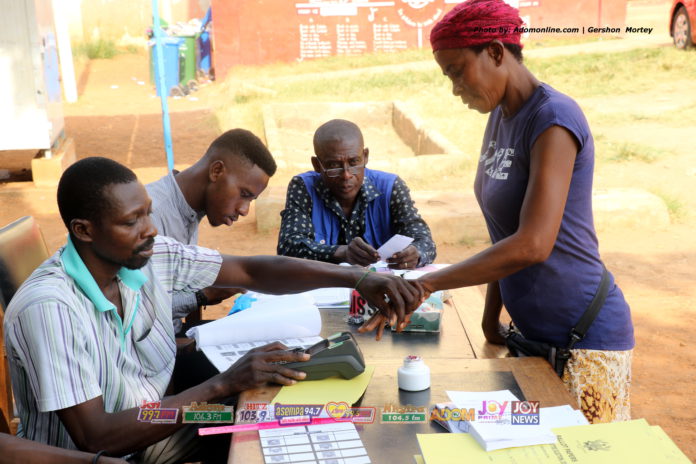The Electoral Commission (EC) of Ghana is racing against time to compile a new Voters Register for the 2020 polls.
The Commission has announced the last week in June to start the exercise after the dreaded coronavirus disrupted earlier plans to roll out the programme in April 2020.
The new register will pave the way for the organisation of the 2020 polls, as the EC insisted its biometric equipment has become obsolete and not fit for purpose, while an upgrade would be more expensive.
It is a a decision opposed by the Inter-Party Resistance against the New Voters Register (IPRAN).
The political parties are backed by 18 civil society organisations who maintained that a new register was not value for money, as the commission could fix the equipment.
READ ALSO:
The EC has quoted $56 million as the cost for the procurement of a new biometric system, which it said was lower than what it would cost to upgrade the existing one.
A leading voice on the Civil Society Organisations front on the issue, Bright Simmons, had contended that had the EC had done a request for quotation, it would find that the $56 million it quoted as reasonable was actually very high.
The New Patriotic Party and 12 other parties have maintained their stance since 2012 that the voters register was bloated and hence have called for a new register.
In 2016, the Supreme Court directed the EC to purge the voters’ roll off persons who registered using National Health Insurance cards, as it was not proof of citizenship.
With the majority of the political parties in favour, the EC has resolved to conduct the exercise despite the scourge of the coronavirus.
At an Inter-Party Advisory Committee on Wednesday, the EC met 17 political parties to outline its plans.
After procuring all the necessary equipment, including over 8,500 Biometric Voters Register Kits (BVRs), the EC is to register 16.5 million Ghanaians within 38 days.
Below are the modalities for the registration which will take place after Parliament passes the new Constitutional Instrument (C.I.) laid by the EC to make the Ghana Card and the Ghanaian passport the legal identification documents for registering people in the new biometric voters’ register:
COMMENCEMENT AND PERIOD OF THE REGISTRATION EXERCISE
The Commission has slated the registration exercise to take place from the last week of June to the end of July 2020. It will start each day from 7:00 a.m. to 6:00 p.m. It will take place at all 33,367 polling stations, which will serve as registration centres nationwide.
METHODOLOGY FOR THE REGISTRATION EXERCISE
The cluster system of registration will be used during the upcoming exercise. It will be done simultaneously in all the districts/constituencies nationwide, with each cluster consisting of five (5) registration centres.
In all, there will be five (5) phases during the registration period with each Registration Team working for a period of six (6) days in each phase within the cluster. However, a day is set aside to assemble and prepare the materials for the next phase.
MOVEMENT PLAN
Information on the movement plan of the Registration Teams will be communicated to all stakeholders.
CRITERIA FOR ELIGIBILITY
An applicant must be;
a) A Ghanaian Citizen
b) 18 years of age or older
c) Of sound mind
d) Resident or ordinarily resident in an electoral area
e) Persons not prohibited by any law in force from registering as a voter
ISSUANCE OF VOTER ID CARDS
All eligible voters will be given instant voter ID cards when they register, except in cases where applications have been challenged.
REGISTRATION KITS
Each district will be allocated a number of BVR Kits depending on the number of clusters it has in order to perform its functions satisfactorily.
MOPPING-UP
The Commission will use three (3) days for a mopping-up exercise which will be done at the end of the main Registration Exercise. This exercise is meant for eligible applicants who could not be captured during the main Registration Exercise.
PILOTING
There will be a pilot exercise at different locations in all 16 regions as well as at the national level at the EC’s Head office in Accra. The exercise is aimed at identifying possible problems associated with the new system and find ways of mitigating them. It will also help to study and ascertain the environmental impact on the VMS in respect to the weather (wet, dry, heat, and rust) conditions amongst others.
MEASURES TO CURB THE SPREAD OF COVID-19
The Commission said it will put in safety measures at each registration centre to ensure the safety of all applicants and registration officials during the exercise.
PROOF OF ELIGIBILITY
Anyone of the following documents can be presented at the registration centre by an applicant to prove his/her eligibility:
1. A Passport
2. Ghana Card
3. In the absence of the two documents above, an applicant will need two (2) guarantors who are registered voters to guarantee his/her application for registration. A guarantor can guarantee for up to 10 applicants.
EC has advised agents of political parties to refrain from physically preventing suspected unqualified applicants from registering but rather resort to the challenge mechanism.
LOGISTICS
All materials needed for the registration exercise have been procured according to the Electoral Commission.
SECURITY
The Commission said it has written to the police for assistance to protect the registration materials and other properties of the Commission before, during and after the exercise.
The Commission is calling on all stakeholders to co-operate with it to make the compilation of the new voters register a success.

